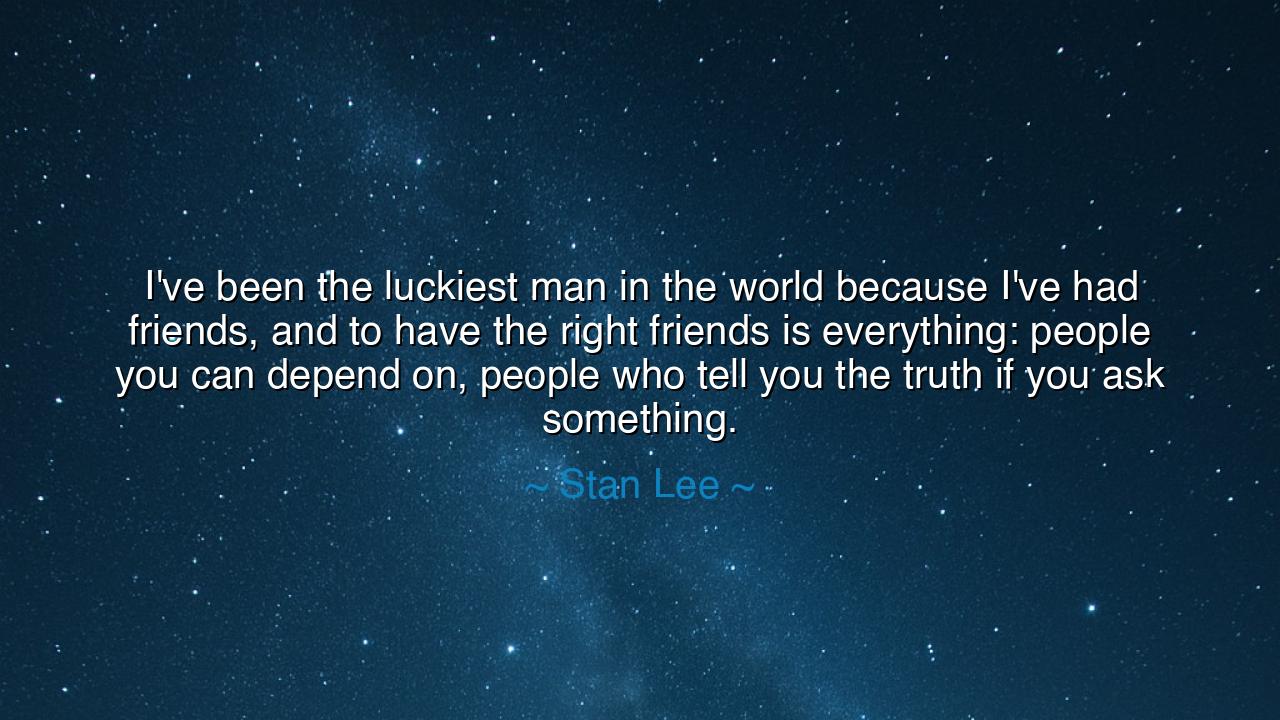
I've been the luckiest man in the world because I've had
I've been the luckiest man in the world because I've had friends, and to have the right friends is everything: people you can depend on, people who tell you the truth if you ask something.






Hear the words of Stan Lee, the great storyteller of heroes, who declared: “I've been the luckiest man in the world because I've had friends, and to have the right friends is everything: people you can depend on, people who tell you the truth if you ask something.” Within this saying lies no fleeting thought, but the distilled wisdom of a long life. For in the end, fortune is not counted in gold nor in crowns, but in friends—true friends, who stand beside you not for gain, not for show, but for loyalty and truth. Such companionship is rarer than jewels, more enduring than monuments, and more life-giving than power or fame.
The ancients knew this secret well. The philosophers of Greece and Rome proclaimed that no man could be truly blessed without friendship. Wealth fades, youth withers, kingdoms fall, but a true friend endures through storm and fire. Cicero, the Roman statesman, once declared that friendship “doubles joy and cuts sorrow in half.” Stan Lee, in his modern tongue, echoes this same eternal wisdom: to walk with those you can depend on is the greatest fortune of all.
But note also the second part of his teaching: the right friends are not those who flatter, nor those who follow you blindly, but those who will speak truth to you when you seek it. For what good is a companion who will not be honest? A friend who fears to tell the truth leaves you wandering in shadows. Better one companion who speaks with painful honesty than a hundred who drown you in sweet lies. This is the friendship that makes a man rich, for it anchors him in reality and guides him toward wisdom.
Consider the story of Abraham Lincoln, who gathered around him a cabinet not of flatterers, but of rivals and critics. He knew that leadership demanded truth, even when truth was uncomfortable. His friends and allies, though often in conflict with him, sharpened his judgment and helped him carry the unbearable burden of a nation at war with itself. Lincoln was great not only because of his vision, but because he surrounded himself with those who dared to speak truth. His friendships, forged in honesty, shaped the destiny of a people.
So too did Stan Lee himself live this teaching. As the creator of worlds filled with heroes and villains, he worked side by side with artists, writers, and dreamers. He knew the loneliness of creation and the burden of leadership, yet he always honored his companions. His success was not his alone, but the fruit of collaboration, of trusting others, of hearing hard truths about stories and characters until they shone like polished steel. His fortune was not in money, but in the loyal circle of friends who walked with him on the journey of imagination.
The lesson is clear: do not measure your wealth in possessions, but in friends. Seek not many, but seek the right ones—those who lift you up when you stumble, who tell you truth when you wander, who rejoice when you triumph, and who weep when you suffer. Such friends cannot be bought, only earned by loyalty, kindness, and trust. And once found, they are treasures greater than kingship.
Therefore, live in this way: be yourself a true friend to others. Do not flatter, but speak truth with love. Do not vanish in times of hardship, but stand firm as a rock for those who depend on you. And when you find companions of such spirit, honor them, guard them, and walk with them all your days. For then you will know, as Stan Lee knew, that you are among the luckiest of all men, not because of fame or fortune, but because you have tasted the eternal gift of friendship and truth.






HGPham Huong Giang
This quote from Stan Lee highlights how invaluable genuine friendships are. But I can’t help but wonder: what if you don’t have those kinds of friends? How do we navigate life without that solid support system, especially when we feel isolated or misunderstood? Is it possible to build these kinds of friendships later in life, or is it something we’re fortunate to have early on? And what role do we play in being that dependable friend?
LLDuc Luong Le
Stan Lee’s reflection on friendship reminds me how essential it is to have people in your life who can both support you and tell you the truth. But I wonder, can true friends ever be too honest? How do we balance kindness and honesty in our relationships, especially when the truth might hurt? Is there ever a moment when being too truthful crosses the line into harshness, or is the truth always worth hearing?
TTPham Thuy Trang
Stan Lee’s view of friendship highlights the importance of trust and honesty. It makes me think: Is having friends who tell you the truth a rare gift? In a world where people often sugarcoat reality to avoid conflict, can we truly rely on others to be brutally honest with us? What does it take to cultivate such relationships, and how do we make sure we’re the kind of friend who offers that kind of truth?
TNThanh Nhu
Stan Lee’s words about friendship resonate deeply. It’s true that having the right friends—those who are dependable and honest—can shape our lives in profound ways. But is it possible to always find such people? Are there risks in trusting others too much or expecting them to always tell the truth? How do we discern the right friends from those who may be less genuine, and how does that affect our relationships?